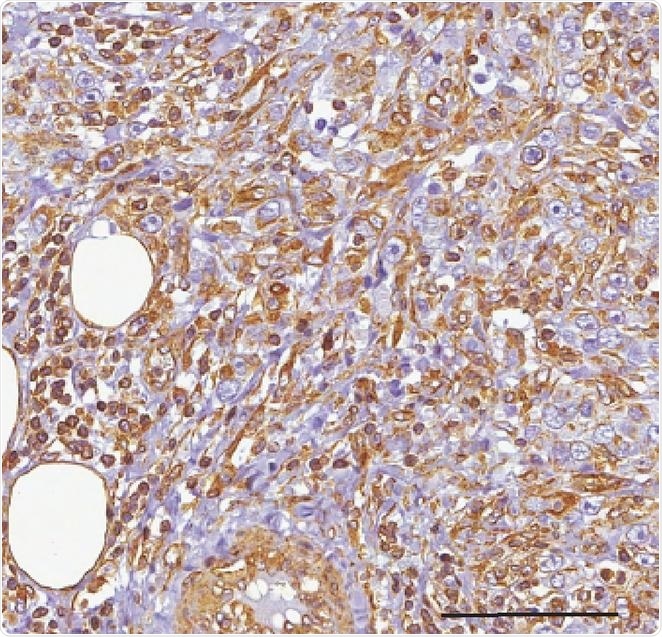A research team from Italy has discovered a pair of microRNA molecules that assist in maintaining a population of cancerous stem cells that fuel the growth of breast cancers and trigger tumor relapse after treatment.

Tumor sample from a breast cancer patient expressing high levels of the microRNAs miR-146a and miR-146b. Image Credit: ©2021 Tordonato et al. Originally published in Journal of Cell Biology. https://doi.org/10.1083/jcb.202009053.
Recently published in the Journal of Cell Biology (JCB), the research shows that when these microRNAs are targeted, cancer stem cells become more vulnerable to certain chemotherapies and may boost the prognosis of patients with aggressive types of breast cancer.
Several tumors consist of a small group of cancer stem cells, which stimulate tumor growth and eventually lead to different cell types present in tumors. Furthermore, since cancer stem cells are usually resistant to chemo- and radiotherapies, they may survive and induce tumor relapse and metastasis after the initial stages of treatment.
For instance, in breast cancer, tumors with a relatively high number of cancer stem cells exhibit a much worse prognosis compared to tumors with fewer stem cells.
Hence, destroying these stem cells could be important for the effective treatment of breast cancer and other forms of tumors. MicroRNAs are one type of molecule that may aid cancer stem cells in their survival inside tumors. These short RNA molecules regulate the levels of hundreds of longer, protein-encoding “messenger” RNAs and thus control the fate and identity of cells.
We wanted to identify microRNAs required for the maintenance of normal mammary stem cells that are inherited by cancer stem cells and could represent potential therapeutic targets in breast cancer.”
Francesco Nicassio, Principal Investigator and Center Coordinator, Center for Genomic Science, Italian Institute of Technology, Milan
Nicassio and collaborators, including co-senior author Pier Paolo Di Fiore, a group leader at the European Institute of Oncology and professor at the University of Milan, found two closely related microRNAs, miR-146b and miR-146a, found in both breast cancer stem cells and normal mammary stem cells, as part of the new research.
In fact, the levels of these two microRNAs were found to be substantially higher in aggressive breast cancers with a high number of cancer stem cells and a poor prognosis.
The researchers discovered that miR-146a/b are needed to keep the pool of cancer stem cells. When these two microRNAs were depleted from patient-derived cancer cells, they lost their ability to form new tumors when injected into mice.
Nicassio and team identified that miR-146a/b control hundreds of messenger RNAs, regulating a wide range of cellular processes including DNA replication and metabolism. The depletion of miR-146a/b from cancer stem cells could modify these processes, making the cells more susceptible to chemotherapy.
Nicassio and colleagues discovered that decreasing miR-146a/b levels rendered breast cancer stem cells over 20 times more sensitive to methotrexate, greatly enhancing the ability of this metabolic inhibitor to limit tumor growth in mice.
While the molecular details remain to be determined, our results clearly show that reducing miR-146a/b levels represents an attractive approach to overcome some forms of drug resistance in the clinical setting, unmasking a ‘hidden vulnerability’ exploitable for the development of anti-cancer stem cell therapies.”
Francesco Nicassio, Principal Investigator and Center Coordinator, Center for Genomic Science, Italian Institute of Technology, Milan
Source:
Journal reference:
Tordonato, C., et al. (2021) miR-146 connects stem cell identity with metabolism and pharmacological resistance in breast cancer. Journal of Cell Biology. doi.org/10.1083/jcb.202009053.